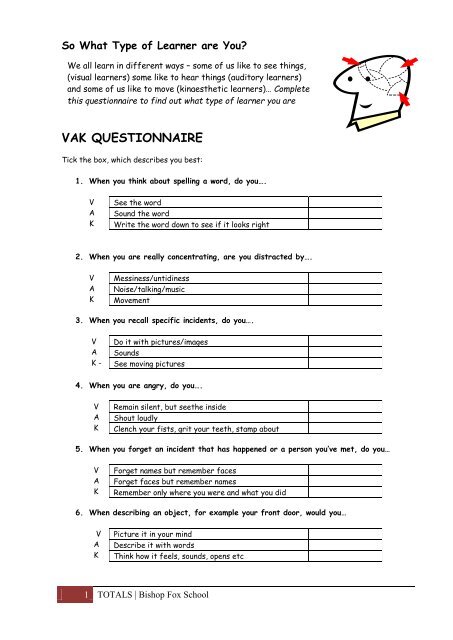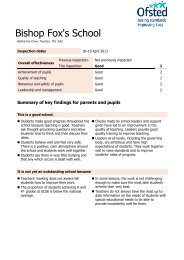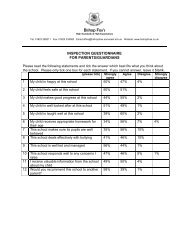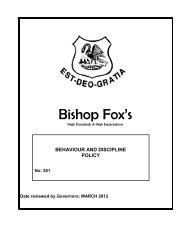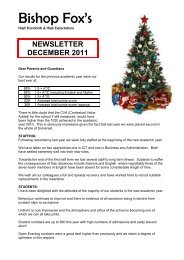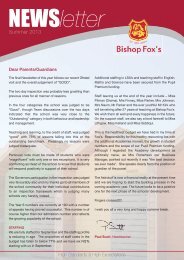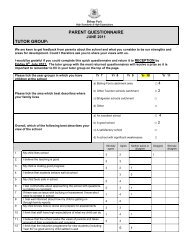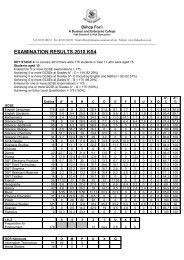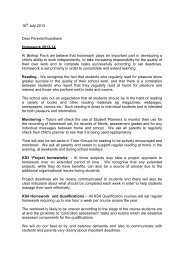What type of learner are you? - Bishop Fox's School
What type of learner are you? - Bishop Fox's School
What type of learner are you? - Bishop Fox's School
You also want an ePaper? Increase the reach of your titles
YUMPU automatically turns print PDFs into web optimized ePapers that Google loves.
So <strong>What</strong> Type <strong>of</strong> Learner <strong>are</strong> You?<br />
We all learn in different ways – some <strong>of</strong> us like to see things,<br />
(visual <strong>learner</strong>s) some like to hear things (auditory <strong>learner</strong>s)<br />
and some <strong>of</strong> us like to move (kinaesthetic <strong>learner</strong>s)… Complete<br />
this questionnaire to find out what <strong>type</strong> <strong>of</strong> <strong>learner</strong> <strong>you</strong> <strong>are</strong><br />
VAK QUESTIONNAIRE<br />
Tick the box, which describes <strong>you</strong> best:<br />
1. When <strong>you</strong> think about spelling a word, do <strong>you</strong>….<br />
V<br />
A<br />
K<br />
See the word<br />
Sound the word<br />
Write the word down to see if it looks right<br />
2. When <strong>you</strong> <strong>are</strong> really concentrating, <strong>are</strong> <strong>you</strong> distracted by….<br />
V<br />
A<br />
K<br />
Messiness/untidiness<br />
Noise/talking/music<br />
Movement<br />
3. When <strong>you</strong> recall specific incidents, do <strong>you</strong>….<br />
V<br />
A<br />
K -<br />
Do it with pictures/images<br />
Sounds<br />
See moving pictures<br />
4. When <strong>you</strong> <strong>are</strong> angry, do <strong>you</strong>….<br />
V<br />
A<br />
K<br />
Remain silent, but seethe inside<br />
Shout loudly<br />
Clench <strong>you</strong>r fists, grit <strong>you</strong>r teeth, stamp about<br />
5. When <strong>you</strong> forget an incident that has happened or a person <strong>you</strong>’ve met, do <strong>you</strong>…<br />
V<br />
A<br />
K<br />
Forget names but remember faces<br />
Forget faces but remember names<br />
Remember only where <strong>you</strong> were and what <strong>you</strong> did<br />
6. When describing an object, for example <strong>you</strong>r front door, would <strong>you</strong>…<br />
V<br />
A<br />
K<br />
Picture it in <strong>you</strong>r mind<br />
Describe it with words<br />
Think how it feels, sounds, opens etc<br />
1 TOTALS | <strong>Bishop</strong> Fox <strong>School</strong>
7. When <strong>you</strong> <strong>are</strong> learning do <strong>you</strong> prefer…<br />
V<br />
A<br />
K<br />
Work that is written down in many colours<br />
Listening to a person talk or give instructions<br />
Participate in activities, making or doing<br />
8. When <strong>you</strong> do leisure activities, do <strong>you</strong> prefer…<br />
V<br />
A<br />
K<br />
Watch TV, read, play on the computer<br />
Listen to music<br />
Play sports and games<br />
9. When <strong>you</strong> <strong>are</strong> talking do <strong>you</strong>…<br />
V<br />
A<br />
K<br />
Talk little and <strong>are</strong> reluctant to listen for too long<br />
Like to listen and talk as well<br />
Talk with <strong>you</strong>r hands and gesture a lot<br />
10. When <strong>you</strong> receive praise or a reward, do <strong>you</strong> prefer…<br />
V<br />
A<br />
K<br />
Receive a written note or certificate<br />
Hear it said to <strong>you</strong><br />
Be given a pat on the back’ or handshake<br />
TOTALS<br />
Total number <strong>of</strong> V’s<br />
Total number <strong>of</strong> A’s<br />
Total number <strong>of</strong> K’s<br />
The letter that has the highest scores indicates <strong>you</strong>r preferred way <strong>of</strong> learning. Many people do<br />
not have a really strong preference and can work easily with all 3 styles.<br />
Once <strong>you</strong> know how <strong>you</strong> learn then <strong>you</strong> can adapt <strong>you</strong>r revision to suit <strong>you</strong>.<br />
Sounds simple doesn’t it!!!!<br />
!<br />
A variety <strong>of</strong> revision strategies always works best<br />
2 TOTALS | <strong>Bishop</strong> Fox <strong>School</strong>
<strong>What</strong> <strong>type</strong> <strong>of</strong> <strong>learner</strong> <strong>are</strong> <strong>you</strong>?<br />
Very few people <strong>are</strong> lucky enough to have a photographic memory – just read it once and<br />
know it <strong>of</strong>f by heart! Most people learn in different ways and to find the best way to<br />
revise <strong>you</strong> need to find out what <strong>type</strong> <strong>of</strong> <strong>learner</strong> <strong>you</strong> <strong>are</strong>. Below <strong>are</strong> some helpful tips for<br />
revising and learning, try as many <strong>of</strong> them as <strong>you</strong> can until <strong>you</strong> find out the best way that<br />
<strong>you</strong> learn. Remember everyone is different and what might work for <strong>you</strong>r friend or <strong>you</strong>r<br />
mentor may not work for <strong>you</strong>.<br />
Auditory <strong>learner</strong>s – <strong>you</strong> <strong>are</strong> good at listening c<strong>are</strong>fully<br />
Tips for revising and learning:<br />
- read things out loud when revising<br />
- try and talk through <strong>you</strong>r work with someone else<br />
- discuss <strong>you</strong>r ideas with someone else<br />
- possibly use a tape recorder for notes<br />
- talk quietly to <strong>you</strong>rself when <strong>you</strong> take notes<br />
- ask people to explain things again and talk it through<br />
- Listen c<strong>are</strong>fully<br />
Visual Learners – <strong>you</strong> <strong>are</strong> good at learning looking at things<br />
Tips for revising and learning:<br />
- try and see something in print before <strong>you</strong> try to<br />
remember it.<br />
- use colour illustrations or diagrams in <strong>you</strong>r notes<br />
- underline key words in colour pen<br />
- draw mind maps to link ideas together<br />
- use different colour paper for different topics<br />
- use flash cards or post-it’s to show main point<br />
Kinaesthetic Learners – <strong>you</strong> learn by doing tasks<br />
Tips for revising and learning:<br />
- write things down in <strong>you</strong>r own words<br />
- make <strong>you</strong>r own tapes <strong>of</strong> notes<br />
- use mind mapping or spider diagrams to set out complicated notes<br />
- use a computer to make revision notes<br />
- work with a partner when revising, talk it through together<br />
- use symbols and abbreviations in <strong>you</strong>r notes<br />
- use post-its or highlighter pens to organise <strong>you</strong>r notes<br />
- when reading, finger trace the keywords and main headings and<br />
read them out loud.<br />
3 Auditory <strong>learner</strong>s – <strong>you</strong> <strong>are</strong> good at listening c<strong>are</strong>fully | <strong>Bishop</strong> Fox <strong>School</strong>


